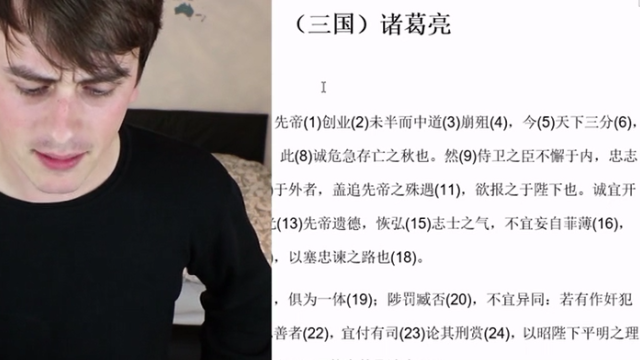【英國流行文化】Manners 禮貌
Listen & Learn 聽力練習
Read & Translate 讀譯練習
(以下請練習翻譯,分享翻譯稿請點擊圖片右方‘貢獻翻譯稿’。)
I think one of the things that’s confusing for people is when they come here is there appears to be hundreds and hundreds of rules, hundreds of things you should and shouldn’t do. And the truth of it is that most of them are about class. And lots of them are trip-wires actually for people who don’t know them. So what I tried to do in my book was take it back to the first principle and say look – there are anthropological reasons why we have certain kinds of manners. So I’ll give you a very good example, in Britain there are sort of two ways of holding a knife very broadly. And broadly speaking the middle-classes hold it with the index finger on the top, gripped in the hand. And working-class people hold it like a pen. Tiny a class depiction and people mercilessly exploit it if they want to. The truth of it is, the one way not to hold a knife at the table, is clasped in your fist, raised as if to kill your guest. And what does that tell us about eating? Well what that tells us about eating is two things, which is never confuse your guests with either the food or the enemy. Don’t eat them and don’t kill them. That’s about how you should hold your knife, because actually manners are really about the reduction of violence. There’s a lot in there about reducing violence. So that’s just an illustration of what one tries to do so actually when you look at real table manners they’re about people feeling comfortable with each other, sharing food around a table. Very important human thing.
And are things actually getting worse?
Very broadly speaking, we all rub along together pretty well actually, we don’t do so badly. The trouble with bad manners is that when you experience it it completely occupies your field of vision. So you feel completely knocked back and rather hurt by somebody.
Should foreigners, say, comply with British manners when in Britain or just be themselves?
Well I think one issue we should be very gentle with is because we’re not terribly good at understanding that there are lots of different customs from round the world, so you know, be gentle. But I think the thing what I would say to anybody going to any other culture, any other country in the world: Number one – be curious, ask yourself. The other thing is don’t think there’s a right and a wrong way to do things in terms of little funny details. Always remember that fundamentals matter more than anything else. ‘Please’ and ‘Thank You’ is a gift and a grace in any language so treat people in the fundamental purpose of manners which is to make life easier. If I can give you a definition of manners, is it the reduction of actual or potential violence between strangers. So always seek to defuse conflict, always seek to reach out and offer yourself to other people, always seek to open the door and let them through. Always do those kind of things because actually you’ll find people love it and they’ll respond to you.
Simon Fanshaw, it would be very bad manners of me not to say, ‘thank you’ for coming to talk to us.
Our reporter Mark, minding his p’s and q’s there. And that’s it for this time. Please remember that the opinions expressed in Trend UK are those of the individuals concerned, and not necessarily the views of the British Council. Don’t forget, you keep up with contemporary UK by using our local British Council Information Centre. Or by checking our website , that’s hcouncil [all one word] .org. Just follow the links under ‘Contact Us’. And while you’re on the website you can also update your English by checking out the words and phrases in the Trend UK online glossary. And tell us what you think by sending us a comment or voting in the online poll. But for now, from me and all the Trend UK Team, bye bye.
Tricky Words 生詞示例
A stereotype is a popularly held belief about a type of person or a group of people which does not take into account individual differences.
A trip-wire here means a mistake that you can easily make without knowing.
Anthropological means concerned with the study of humankind.
Mercilessly means without pity.
If you comply, you act in accordance with someone's rules, commands or wishes.
- 相關(guān)熱點:
- 英語自我介紹范文











